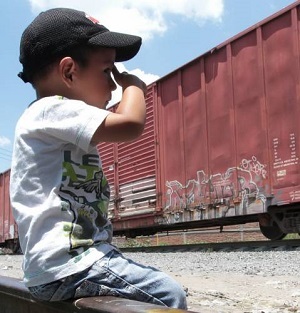By Raquel O'Byrne
Program Associate, Program for Global Advocacy
"Most Dangerous Country" may be the least desirable title in the world and yet the one that Honduras, El Salvador and Guatemala often battle for, leading to thousands of people from Central America's northern triangle seeking refuge in other countries, including the United States. Recent immigration debates have focused on the millions of children fleeing their homes because of widespread violence yet being denied rightful refugee status abroad. In response, aid being provided to those countries has focused almost solely on security, not on creating sustainable strategies that would be preventative. Aid should focus on strengthening human rights and rule of law, the weaknesses that make these countries vulnerable to violence.
In El Salvador, where there is no "conflict" per se, some 2,000 homicides have occurred so far this year -- in a country with a population smaller than New York City's. Most of the deaths can be attributed to drug-related crimes and inter-gang violence, which have helped turn Central America into a security nightmare for citizens. Extortion, violent gang recruitment and sexual violence are everyday realities for children in these countries, forcing families to send them off on a journey that may lead to their death.
On July 29, after visits by the presidents of Honduras, El Salvador and Guatemala to Washington to discuss the immigration crisis, members of the Congressional Progressive Caucus listened to the testimony of three teenagers from the northern triangle, as they described the violence that they had experienced in their home countries. Dulce Medina, a 15-year old Guatemalan, described the near rape she and her younger sister endured prior to fleeing the country -- an experience to which many girls are exposed prior to leaving or during their journey to the United States.
Domestic violence is another reason children are fleeing their homes. In a recent UNHCR report, Children on the Run¸ an alarming 21 percent of the children surveyed suffered abuse in the home, one aspect of the correlation between greater social inequality and higher incidence of crime. El Salvador, Honduras and Guatemala have consistently higher levels of violence than countries with lower levels of inequality, like Costa Rica and Uruguay.
These states have been unable to provide a secure environment for children and teenagers. Plagued by weak institutions, particularly weak judiciaries, the states' responses to the growing security challenges have failed. Honduras, for example, suffers from widespread crime and impunity for human rights abuses and has remained largely ineffective in addressing government corruption -- proving that security focused aid has had little impact in breaking down the criminal networks that cause many of these issues.
But who is responsible for solving these issues? These countries are neither drug producing nor consuming countries but only transit nations. However, as Foreign Minister Mireya Agüero of Honduras noted last month, a staggering 70 percent of homicides in Honduras are due to drug-related violence, attributing shared responsibility to consuming nations. She also noted that some 20 percent of the country's GDP goes to security, compared to less than 2 percent invested in health care. An investment of that magnitude in security hinders the government's ability to provide the social services necessary for long-term social development.
While all of these countries receive substantial foreign aid, the reality is that most is invested in security programs that focus on immediate responses to drug violence rather than preventive programs that would strengthen the rule of law. A truly comprehensive aid package would tackle some of these issues through higher investment in education, health care, and greater access to services such as family counseling, after-school programs that offer skill trainings, and social integration programs for minors who have been involved in gangs or other criminal networks.
Aid packages should also be focused on strengthening the rule of law, particularly through the judiciary. These efforts should revolve around capacity building, much like International Commission against Impunity in Guatemala (CICIG), one of the most effective initiatives in the region in reducing impunity. By examining the law enforcement and judicial systems and providing them with tools that would allow them to work professionally even after the aid ends, sustainable improvements become possible. Possible technical assistance includes specialized training in investigative practices, witness protection and assistance in creating public policies that support anti-impunity tactics.
The challenges in the region are complex, and the efforts to combat them must be comprehensive. Children reaching the United States should be considered refugees and be granted temporary protected status until they can be guaranteed a safe return to their homes. Without these considerations, the United States will continue to see children at its borders and the world will continue to see these three countries as front-runners in the killing race.
This post originally appeared on Freedom House's blog.
